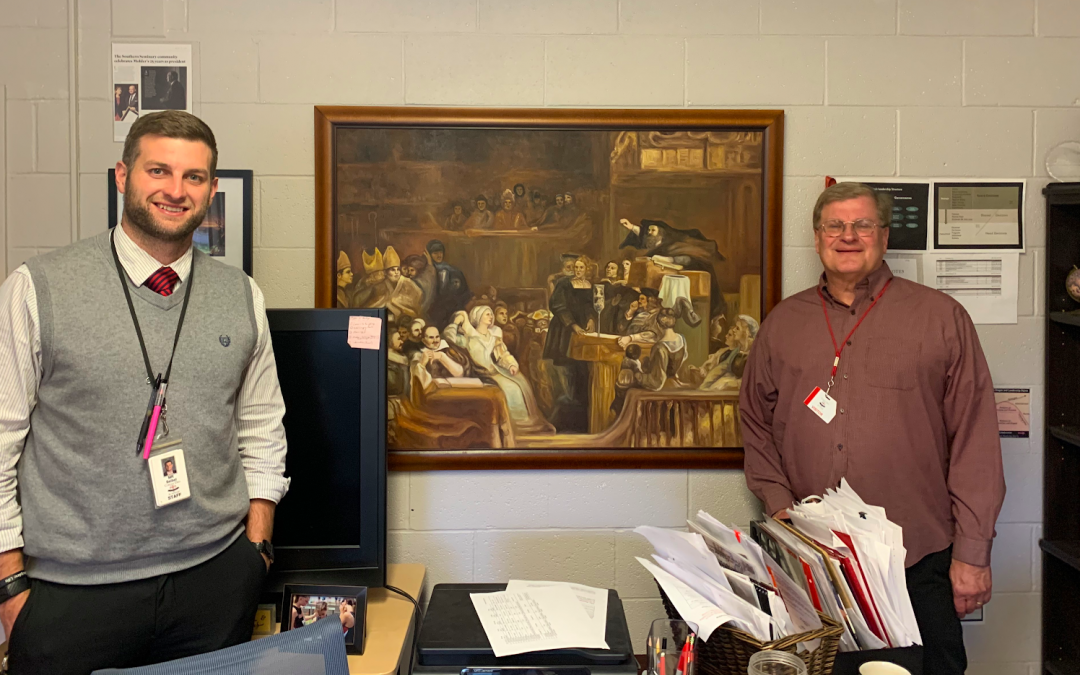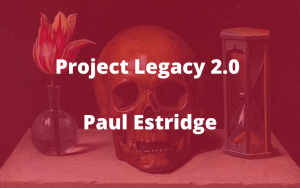by David Seibel, Head of School
In Memory of Knox Lynn Seibel and in Gratitude to Dr. Jim Brandyberry
I have two items displayed prominently in my office: the first a large portrait of 16th century Scottish Reformer John Knox preaching and the second a dedication to my deceased son Knox Lynn Seibel who lived from 10/23/19 to 12/3/19. What we hang on our walls is simply an externalization of what was already hanging in our hearts. In this post, I want to share with you two titanic convictions that have hung in my heart and mind through 2020. On this one year anniversary of my son Knox’s passing, I also want to introduce you to the two messengers of these magnificent truths: Jim Brandyberry and John Knox.
This post is the 19th in Project Legacy, a series of interviews that aim to learn from leaders outside of education to influence those inside education. Probably more than any other post in the Project Legacy series, this post proves the educational dictum ‘non scholae sed vitae’ (not for school but for life) and ‘virtus tentamine gaudet’ (strength rejoices in the challenge). Although this started as an interview with church historian Dr. Jim Brandyberry, it has ended up becoming a testament to the legacy of Knox Lynn Seibel. The first half of this post focuses on Knox my son and the second half on a truth I learned from Dr. Brandyberry.
A Grief Full of Gratitude—Knox Lynn Seibel
On December 3, 2019 I received the call from my amazing wife Brooke that no one wants to receive. Our son was in trouble, and I needed to leave work to come to Community North hospital immediately. I quickly got in my car for the 20 minute drive from the school to the hospital while staying on the phone with my distressed wife. This situation demonstrated the reality in Matt Kearney’s song “Closer to Love” that we are all ‘one phone call away from being on our knees.’ Within an hour, I was on my knees holding my lifeless son who the doctors could not rescue. Six weeks before this tragic day, I had witnessed my wife bring Knox and his twin brother Jonathan into the world in the very same hospital. However, this day was marked by the unexpected and inexplicable passing of my son Knox that I was just getting to know.
I don’t pretend to be any sort of expert on walking by faith in grief but I do have a little bit of experience and perspective that I’d like to share with my fellow sinners, sufferers and saints who will be met with troubles on their journey.
Titanic Truth #1: We are better than we deserve
For the past twelve years, I have driven approximately 60 minutes to Brown County, IN about five times per year to go hunting with my father and brother. Although I don’t have many deer to show from this decade of hunting and driving along 65 South, I have read quite a few books in my treestand and have listened on the drive to almost all 26 of John Piper’s Christian biographies that he gave at the annual Desiring God pastor’s conferences from 1998 to 2014. Just to give you a flavor of these biographies’ content, here are some of the titles:
“He Kissed the Rose and Felt the Thorn: Living and Dying in the Morning of Life Meditations on the Life of Robert Murray McCheyne”
“How Few There Are Who Die So Hard! Suffering and Success in the Life of Adoniram Judson: The Cost of Bringing Christ to Burma”
“Charles Spurgeon: Preaching Through Adversity”
Piper’s presentation of these men’s lives is both convictional as well as compassionate; he spends a year preparing each of these hour long talks so they are not for the faint of heart. I would say along with John Piper, “Biographies have served as much as any other human force in my life to resist the inertia of mediocrity.” The cumulative impact on me of listening to these 30+ hours of biography audio over 10 years has been tremendously elevating. The suffering of the men and women who lived faithfully before my short life enabled me to have this perspective: I am not the first person that has lost a son and I will not be the last. Charles Spurgeon, Adoniram Judson, and Robert Murray McCheyne stood tall in my heart and mind during my grief, because of their courageous faith in trial.
The suffering amongst God’s saints in history is tremendous; it is actually more common to lose children and spouses and health than to not among the 26 biographies done by Piper. Here are a few examples: From Piper’s biography of John Owen,
“We know that (his wife) bore him 11 children, and all but one died as a child, and that one daughter died as a young adult. In other words, Owen experienced the death of eleven children and his wife! That’s one child born and lost on an average of every three years of Owen’s adult life.”
From Piper’s biography of Adoniram Judson,
“There began a life-long battle in the 108-degree heat with cholera, malaria, dysentery, and unknown miseries that would take two of Judson’s wives and seven of his 13 children, and colleague after colleague in death.”
From Piper’s biography of Charles Spurgeon with regard to his rheumatism, gout and Bright’s Disease,
“I thought a cobra had bitten me, and filled my veins with poison.”
Health, wealth, prosperity, safety and affluence were foreign to Judson, Spurgeon, Owen and the majority of human history yet we have come to expect such luxuries. History is no man’s savior, but for me it has provided perspective on death that I would have lacked had I not been acquainted with the lives of these Christian heroes. This ‘cloud of witnesses’ from church history gave me examples to follow during my suffering.
On the day when my son passed away, I was better than I deserved. God is gracious in His giving and He is gracious in His taking. If God was a selfish and erratic wretch like me, I wouldn’t get to have any of the many blessings that are in my life. As a law-breaking sinner, I deserve way worse than losing my son; my sin merits me condemnation, separation from God, and His just wrath. The Son of God, Jesus Christ, gave His life for me, so I think it’s fitting for me to take a few hits along the way and share with Him in suffering. Closing the casket on my son’s life has opened my eyes to the mercy of Jesus Christ. The Gospel teaches believers that we are always better than we deserve.
On Knox’s dedication in my office, it quotes Job 1:21-22 which says,
“And he said, “Naked I came from my mother’s womb, and naked shall I return. The Lord gave, and the Lord has taken away; blessed be the name of the Lord. In all this Job did not sin or charge God with wrong.”
A man suffering need not be a man entitled or bitter. To anyone who questions the righteousness or mercy of God in the death of an infant, I simply pose the question from Genesis 18:25, “Shall not the Judge of all the earth do what is just?” I have come into the earth naked and will leave in like manner. My perspective is finite, flawed and full of self, whereas God’s viewpoint is infinite, eternal and uninhibited. Life is full of peaks and valleys, pleasures and pains, crosses and blessings—on your worst day, you are better than you deserve.
Titanic Truth #2: Men who ignore history have no past and no future.
Jim Brandyberry is a former missionary in Karachi, Pakistan as well as an adjunct professor of Church History at Indianapolis Theological Seminary. He has taught church history for 45 years. My main takeaway from listening to Dr. Brandyberry is this:
A generation which ignores history has no past and no future.
If it were not for Dr. Brandyberry, my son would not have been named Knox. I learned about this hero of mine from Dr. Brandyberry during his Church History class at Indianapolis Theological Seminary.
When I was in Dr. Brandyberry’s Church History class, he introduced me to the character of John Knox, the 16th century Scottish reformer who famously opposed Queen Mary and furthered the Protestant Reformation in the country of Scotland. Knox was a man of conviction, courage and compassion. The quotations below give you a taste of the man:
“I fear the prayers of John Knox more than all the assembled armies of Europe.”
“Grant us, Lord, the perfect hatred of sin.” -Knox
“Give me Scotland, or I die.”
“One man with God is always in the majority.”
Underneath my computer, I have taped a picture of my Knox who passed away and whenever I touch it, I recite to myself, “Any man who stands with God, even if he is alone, stands in the majority.” I don’t think John Knox is the fourth member of the Trinity, but I have never met someone in person that is as courageous and humble as he was. We ignore the lights of the past to our own peril.
I am so thankful that Dr. Brandyberry loved me and my classmates enough to not just share the gospel with us, but to tell us stories about courageous men and women of faith from ages past. Knox was a man of tremendous faith and endurance; due to his faith, he was a galley slave for three years where he was chained to a bench and forced to row an entire day in one posture as guards oversaw him. Dr. Brandyberry taught me that a generation that ignores history has no past and no future. Quotes like that illuminate the need for people to have heroes, in order to make it through times of great duress.
When I asked Dr. Brandyberry if he had any advice for those in education, he said that we should reappropriate CS Lewis’ advice on books to people:
“It is a good rule, after reading a new book, never to allow yourself another new one till you have read an old one in between. If that is too much for you, you should at least read one old one to every three new ones.”
Brandyberry meant that young people should also be interacting with people that are stages ahead of them in life, alive or dead.
The modern perspective on death and dying is much different than ages past. Although we have advanced medically and technologically, we have regressed spiritually in many ways. Therefore, I find the most help not from the Enneagram or authentic pastors in skinny jeans, but rather the ancient wisdom revealed in the Word and the world past. As Lewis wrote,
“A new book is still on its trial and the amateur is not in a position to judge it. It has to be tested against the great body of Christian thought down the ages, and all its hidden implications (often unsuspected by the author himself) have to be brought to light.”
After losing Knox, I was able to use history as a prism of discernment to make sense of our loss. I was able to look to both my contemporaries but also the democracy of the dead. Lewis goes on to say,
“Every age has its own outlook. It is specially good at seeing certain truths and specially liable to make certain mistakes. We all, therefore, need the books that will correct the characteristic mistakes of our own period. And that means the old books.”
In a moving sermon “Songs in the Night,” Spurgeon revealed the struggle of the Christian trying to praise God in the dark:
“It is easy to sing when we can read the notes by daylight; but he is the skillful singer who can sing when there is not a ray of light by which to read,— who sings from his heart, and not from a book that he can see, because he has no means of reading, save from that inward book of his own living spirit, whence notes of gratitude pour forth in songs of praise.”
While many are saying that 2020 has been the worst year of their lives, I can say honestly that 2020 was the year I learned to praise God in the dark. Soli Deo Gloria.




